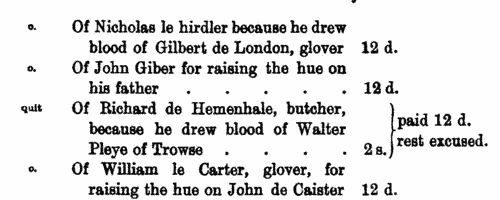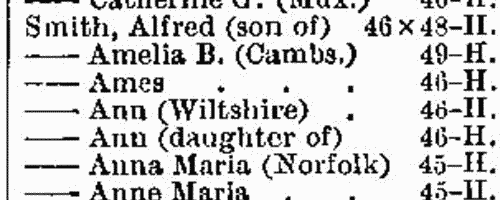Sessons Surname Ancestry ResultsOur indexes 1000-1999 include entries for the spelling 'sessons'. In the period you have requested, we have the following 5 records (displaying 1 to 5): Buy all | | | Get all 5 records to view, to save and print for £24.00 |
These sample scans are from the original record. You will get scans of the full pages or articles where the surname you searched for has been found. Your web browser may prevent the sample windows from opening; in this case please change your browser settings to allow pop-up windows from this site. Curia Regis Rolls
(1219-1220)
The Curia Regis, king's court, of mediaeval England took cases from throughout the country, and its records are among the most important surviving from this early period. Rolls 71 and 71B for Michaelmas term of the 3rd and 4th years, and 72 and 73 for Hilary term and Easter term of the 4th year of the reign of king Henry III (Michaelmas 1219 to Easter 1220) were edited by C. T. Flower of the Public Record Office and published in 1938. Each entry is copied in full, the Latin extended from the abbreviated original, the personal and place names given as in the original; where these vary between duplicate rolls, variant spellings are given in the footnotes. The county of each case was marked in the margin in the originals, and this is shown in italics at the start of each entry in the printed edition. SESSONS. Cost: £4.00.  | Sample scan, click to enlarge

| Close Rolls
(1313-1318)
The close rolls of the 7th, 8th, 9th, 10th and 11th years of the reign of king Edward II record the main artery of government administration in England, the orders sent out day by day to individual officers, especially sheriffs of shires: they are an exceptionally rich source for so early a period. In amongst this official material, the rolls were also used as a way of recording many acknowledgments of private debts and contracts between individuals. Most of the contents relate to England, but there are also entries concerning Wales, Scotland, Ireland and the English possessions in France.SESSONS. Cost: £4.00.  | Sample scan, click to enlarge

| Inhabitants of Norwich
(1288-1391)
Among the documents preserved in the record room of the Guildhall in the city of Norwich were 13 rolls connected with the leet courts in the city during the 13th and 14th centuries while the frankpledge system on which they were based was still in full operation. William Hudson, vicar of St Peter Permountergate in the city, prepared a copy of the earliest of these, from 1288, and extracts from the leet rolls of 1289, 1290, 1291, 1293, 1296, 1300, c1307, 1313, 1375 and 1391, and from an account of amercements in 1364, a tithing roll of Mancroft leet of 1311, and inquisitions before the bailiffs in 1350, and these were published by the Selden Society in 1892, with an English translation facing the extended Latin text. In 1288 there were four leets in the city - Conesford (North Conesford, South Conesford and Berstrete subleets), Manecroft (St Stephen, St Peter de Manecroft), Wymer or Westwyk (St Giles, St Gregory, St Andrew and St George), and Over the Water (St Michael and St Clement. Each leet had separate courts and separate records within the rolls. Hudson lists the main categories of items recorded as: murder, violent death, nuisances, weights, unwholesome food, larceny, assaults, hue and cry, being out of tithing, non-attendance at leet, purprestures, forestalling, unlawful trading, craft gilds, fraudulent work, and impleading in the Court Christian. SESSONS. Cost: £4.00.  | Sample scan, click to enlarge

|  Apprentices and trainee clerks
(1762) Apprentices and trainee clerks
(1762)
Apprenticeship indentures and clerks' articles were subject to a 6d or 12d per pound stamp duty (late payment of the 6d rate attracted double duty (D D) of 12d): the registers of the payments usually give the master's trade, address, and occupation, and the apprentice's name, as well as details of the date and length of the apprenticeship. 1 January to 31 December 1762.SESSONS. Cost: £8.00.  | Sample scan, click to enlarge

| Missing Next-of-Kin and Heirs-at-Law
(1890)
The Unclaimed Money Registry and Next-of-Kin Advertisement Office of F. H. Dougal & Co., on the Strand in London, published a comprehensive 'Index to Advertisements for Next of Kin, Heirs at Law, Legatees, &c., &c., who have been Advertised for to Claim Money and Property in Great Britain and all Parts of the World; also Annuitants, Shareholders, Intestates, Testators, Missing Friends, Creditors or their Representatives, Claimants, Unclaimed and Reclaimed Dividends and Stock, Citations, Administrations, Rewards for Certificates, Wills, Advertisements, &c., Claims, Unclaimed Balances, Packages, Addresses, Parish Clerks' Notices, Foreign Intestates, &c., &c.' The original list was compiled about 1880, but from materials dating back even into the 18th century: most of the references belong to 1850 to 1880. For each entry only a name is given, sometimes with a placename added in brackets: there may be a reference number, but there is no key by which the original advertisement may be traced. The enquirer of the time had to remit £1 for a 'Full and Authentic Copy of the Original Advertisement, together with name and date of newspaper in which the same appeared'. This appendix to the list was issued in about 1890.SESSONS. Cost: £4.00.  | Sample scan, click to enlarge

|
Research your ancestry, family history, genealogy and one-name study by direct access to original records and archives indexed by surname.
|








